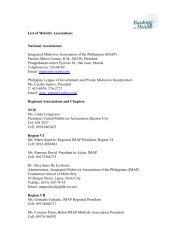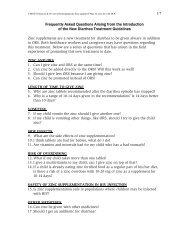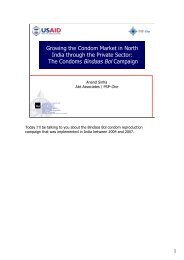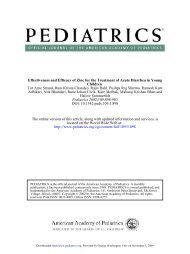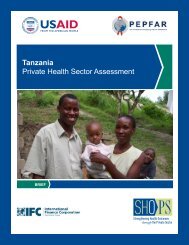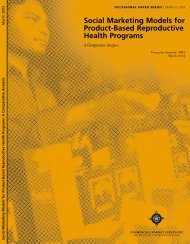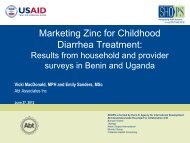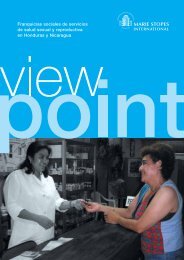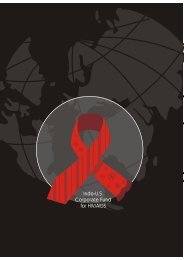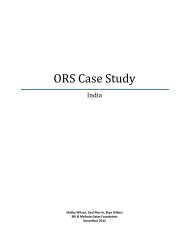Nigeria Private Sector Health Assessment - SHOPS project
Nigeria Private Sector Health Assessment - SHOPS project
Nigeria Private Sector Health Assessment - SHOPS project
Create successful ePaper yourself
Turn your PDF publications into a flip-book with our unique Google optimized e-Paper software.
Table 3: Percentage of retail outlets that perceived difficulties<br />
stocking SFH products, by product<br />
Condom<br />
Oral<br />
contraceptive<br />
Emergency<br />
contraception<br />
Noristerat Depo Provera IUD<br />
6.9% 7.1% 8.9% 10.8% 7.3% 8.2%<br />
Table 4: Percentage of outlets able to refill orders from<br />
wholesaler in less than a month, by product<br />
Condom<br />
Oral<br />
contraceptive<br />
Emergency<br />
contraception<br />
Noristerat Depo Provera IUD<br />
80.2% 66.5% 73.1% 55.1% 59.1% 51.3%<br />
Although far from perfect, these indicators contrast favorably with the public sector’s system. While<br />
efficient, the private sector’s distribution channels are difficult to regulate for quality (see section 5.6).<br />
Unlike most sub-Saharan countries where pharmaceutical products are distributed in channels distinct<br />
from fast-moving consumer goods, in <strong>Nigeria</strong> these products are distributed in the same channels and<br />
are handled and stored by traders in conditions inappropriate for pharmaceutical products.<br />
Like pharmacists, PMVs resupply from pharmaceutical wholesalers and are subject to the same<br />
transportation and restocking costs, although the range and quantity of their products is generally a<br />
small fraction of a pharmacy’s. SFH estimates that 200,000 PMVs operate in <strong>Nigeria</strong>, although it is hard<br />
to identify a reliable source of data for this figure. As with other facilities, licenses are issued at the state<br />
level and there is no authority aggregating data at the national level. Moreover data at the state level is<br />
likely to be unreliable. Issuing of PMV licenses has passed from the Ministry of <strong>Health</strong> to the PCN, which<br />
has been reluctant to issue licenses. According to the PMV association, a large number of PMVs operate<br />
with their license applications pending for longer than a year. This delay has lead to a number of PMVs<br />
operating without licenses.<br />
According to the regulations, PMV proprietors only need to read, write, and pass an interview. In fact a<br />
significant number of PMV proprietors have medical training well beyond what it required—community<br />
health agents, midwives, and nurses all operate PMVs. The assessment team met a retired nurse and a<br />
midwife who operate PMVs. Both of them said that they opened a PMV facility because it was the easiest<br />
facility to obtain a license for and establish in terms of the regulatory requirements and the required<br />
capital. It is hard to know how prevalent this situation is, but it points to one reason so many PMVs<br />
exceed the scope of practice for their facility and to the difficulties of small health entrepreneurs. Both<br />
the nurse and the midwife admitted to selling antibiotics, giving injections, and providing other drugs<br />
not on the approved list of medicines for PMVs. When asked about it, they maintained that the scope<br />
of practice for their profession allowed them to supply these products and services, even though they<br />
were operating in a facility that is not legally able to do so.<br />
According to many informants, the intent of creating the PMV facility was to increase access to basic<br />
palliative care in rural areas. A large number of PMVs, however, are established and operating in urban<br />
and peri-urban areas, some in close proximity to pharmacies. The location of PMVs in urban areas is the<br />
20



